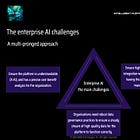📨 Weekly digest: 11 2024 | Time will tell, or not
Can we compromise on safety and transparency? | AI this week in the news; use cases; for the techies
Hello friends,
"More than 100 top artificial intelligence researchers have signed an open letter calling on generative AI companies to allow investigators access to their systems. They argue that opaque company rules are preventing them from using safety-testing tools millions of consumers use. The researchers say strict protocols designed to prevent bad actors from abusing AI systems are instead chilling independent research. Auditors fear having their accounts banned or sued if they try to safety-test AI models without a company's blessing.1"
We are clearly entering a period of tensions between safety and transparency:
Researchers argue for access to test AI systems used by millions. This could help identify and mitigate potential risks before they impact consumers.
Opaque company rules and fear of lawsuits could hinder independent research, which is crucial for ensuring generative AI's safe development and deployment.
Yet, strict protocols are likely in place to prevent malicious actors from exploiting vulnerabilities in AI systems. These security measures are important.
We need a balance.
Generative AI companies should find ways to enable responsible safety research while protecting their systems. Perhaps designated testing environments or anonymized data sets could be made available to researchers.
Striking a balance between safety, transparency, and responsible innovation is crucial for the future of generative AI.
But the main problem remains—as always—communication.
This is an ongoing debate with no easy answers. It's important to ensure the safety and continued development of generative AI.
What do you think?
If you haven't already, you can start with our workbook, Building a data-driven organization.
I am looking forward to reading your thoughts in a comment.
Happy days,
Yael et al.
🦾 AI elsewhere on the interweb
Ranking of generative AI services by traffic, by category and by distribution mode (web/mobile) by a16z
Amazon will let sellers paste a link so AI can make a product page on The Verge
Search Generative Experience could upend over 60% of publishers’ total organic traffic on Adweek
♻️ AI: use cases
Perplexity brings Yelp data to its chatbot on The Verge
For the techies, research papers, and more
Fast access to our weekly posts
🚀 Unbundling AI
📮 Maildrop
🎯 How-tos
🎲 Data and trends
📌 AI case studies
📨 Weekly digest
You are receiving this email because you signed up for Sustainability Insights by Yael Rozencwajg. Thank you for being so interested in our newsletter!
Weekly digest are part of Sustainability Insights, approaches and strategies.
We share tips to help you lead, launch and grow your sustainable enterprise.
Become a premium member, and get our tools to start building your AI based- enterprise.
Not a premium?
Thank you for being a subscriber and for your ongoing support.
If you haven’t already, consider becoming a paying subscriber and joining our growing community.
To support this work for free, consider “liking” this post by tapping the heart icon, sharing it on social media, and/or forwarding it to a friend.
Every little bit helps!
Top AI researchers say OpenAI, Meta and more hinder independent evaluations on the Washington Post https://www.washingtonpost.com/technology/2024/03/05/ai-research-letter-openai-meta-midjourney/









Top AI researchers say OpenAI, Meta and more hinder independent evaluations on the Washington Post https://www.washingtonpost.com/technology/2024/03/05/ai-research-letter-openai-meta-midjourney/